Six Nations: Scotland must adapt after whitewash - Mike Blair
- Published
- comments
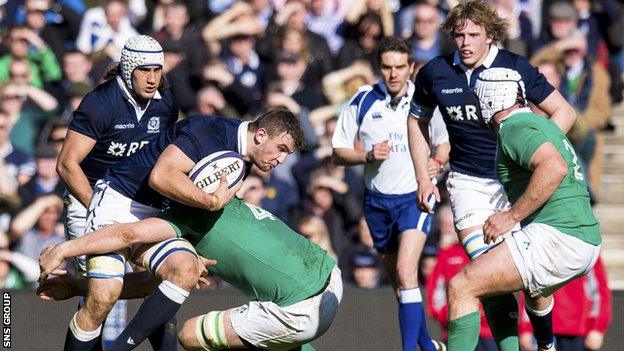
In the last 12 Six Nations tournaments Scotland have managed 12 victories, with none this year
Scotland have a young and inexperienced team and that is what it looked like at Murrayfield on Saturday.
Ireland put in an incredibly professional performance during their title-winning 40-10 victory; attacking organisation, special plays, kicking game and defensive structure were all out of the top drawer.
They had studied Scotland's game and crucially stuck to the script, taking what they had done on the training pitch and putting it into the game in Edinburgh.
This was where the greatest contrast in the teams was to be found; the ability to perform skills and execute roles under pressure.
The best example I could find was when each team attempted to set up a very similar attacking play; a hit in the middle of the pitch and then the construction of a phase play maul with the forwards.
Scotland tried with their first set piece possession in the Irish 22m about 15 minutes in. It will have been a play they practised time and time again during the week, but in the heat of the moment the right players weren't in the right place at the right time and the maul was quickly destroyed by the Irish, creating slow ball.
Ireland absolutely nailed it. A tight-knit pod of forwards were able to weather the initial hit from Jonny Gray and build their maul, not advancing at first but keeping it up and adding players, before moving towards the try line.
This was a team example but there were individual examples throughout the game. Not just the execution of the skill but in the decision-making process too; to offload or not, being an example. Ireland consistently made good decisions under pressure and Scotland did not.
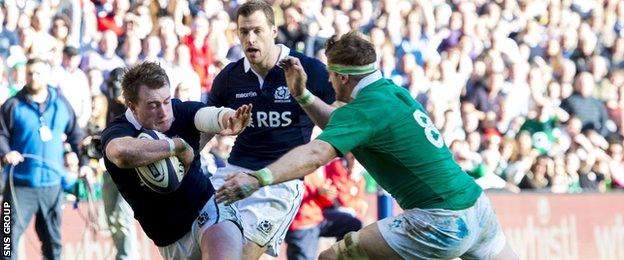
Full-back Stuart Hogg was a bright spark in attack for Scotland
Ireland had a fairly simple phase play structure, forward runners off nine and 10 but when they caused Scotland problems was when they had three or four backs linked together and were able to put in deception plays.
Think Jared Payne's try and the Jonny Sexton wrap around in the lead up to Tommy Bowe's break in the second half. Both plays meant that Scotland's defence had to make decisions. They made the wrong ones.
The heart of the problem was whether the individuals were adhering to the defensive system.
It looked like players were trying to fix things by themselves since there was not a whole lot of uniformity, across the back line in particular.
Matt Scott, as he did against England, stepped up out of line a few times getting in front of the defender inside him. This is not an issue if the players outside are doing the same thing, but they weren't. This means that if the ball carrier under pressure gets the ball away then the outside defender is in no man's land.
Scotland also set quite narrowly, more suited to an up-and-out defence. If you have greater width between players and set on the outside of your man then the rush or blitz defence is easier as you can see everything going on inside you.
My instinct would say that Matt Taylor coaches the up-and-out defence with aggressive line speed, pushing from the inside. He has maybe given Scott free reign to take man and ball if he's certain of executing, but these gambles have not paid off.
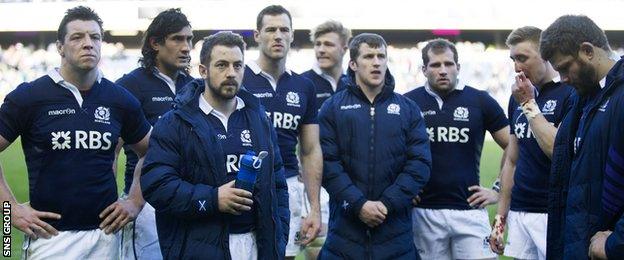
Scotland lost all of their Six Nations matches this season
In attack, there were some good moments and I particularly like the way Dave Denton tried to take the game by the scruff of the neck, demanding the ball and often carrying well. Stuart Hogg continued his excellent form too and is a genuine threat every time he gets the ball.
An area to possibly address is getting into good attacking shape from turnover ball or kick receipt as our transition attack was not as accurate or fluid as it should be and looked disjointed at best.
Prior to the Six Nations, there was a positive buzz around the Scotland camp and amongst supporters. There was improvement in the autumn internationals and young prospects were coming to the fore.
If you were to put a highlights reel together of all Scotland's good things done during the championship it would be the best in a decade but, sadly, the errors video would be a horror show.
In international rugby the most critical component is keeping errors to a minimum. Twenty-four turnovers for Scotland on Saturday highlights this.
All is not lost though, this is still a very talented group of players - that hasn't changed - but the realisation of what it takes to win at at the top level is now hitting home and the players have to adapt.
- Published23 March 2015
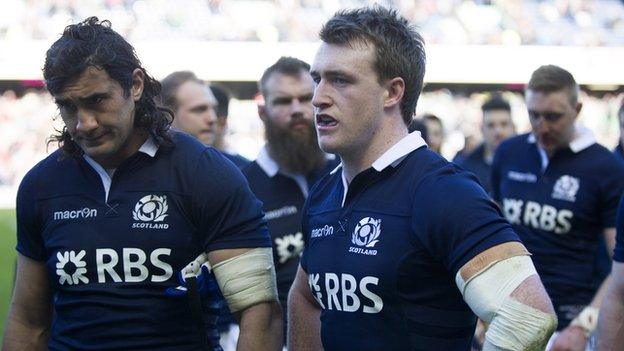
- Published23 March 2015

- Published23 March 2015
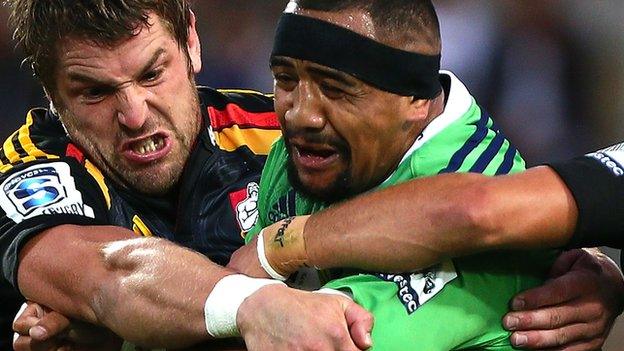
- Published14 September 2016
